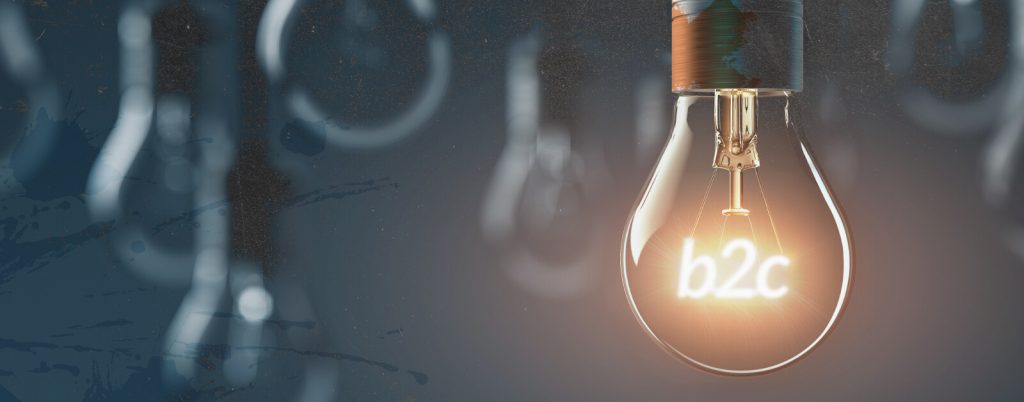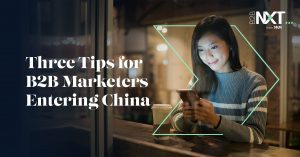3 min read

Now, I may be biased, but I think B2B marketing is an especially exciting place to be right now. That’s not to say B2C has nothing to offer us B2B marketers.
I think we’re always stronger for finding inspiration in other places, so here are four lessons B2B marketers can learn from B2C.
Your customers are only human
It’s understandable that B2B marketing has traditionally taken a more product-focused approach.
If you need to buy an expensive laser jet printer for the office – to use a simple example – it’s surely important to know things like how many pages it can print for your money?
But aren’t all printers pretty much identical? Most people don’t even care about the nuts and bolts, so focus on how your product makes their lives better or easier.
In fact, research from Google and CEB’s Marketing Leadership Council found that, where differentiation does exist, only 14% of B2B decision-makers are willing to pay a premium for it.
Instead, use a data-driven approach to get a clearer picture of your customers at an individual level. Treat them as the human beings they are.
It will help you find out what they’re talking about and what their issues are. Then you can develop messaging around how your product solves their specific problems.
Take a leaf out of the consumer marketing world’s book. Show them how buying your product will make them a hero within their organisation for making a successful business decision.
My colleague Caroline Lotinga has a great introduction to data-driven marketing here.
Emotions
Starting to see your customers as human beings? Good. Now you can appeal to their emotions.
This is where B2C has really shone. And where B2B, in the past, has not.
Brand storytelling has been a powerful tool for making an emotional impact on B2C audiences.
It’s often assumed that the B2B buying process is more logical and analytical. But ultimately, B2B buyers are still people. They don’t leave their emotions and human nature at the office door each morning.
Google’s research also found that, while the B2C brands studied had emotional connections with 10-40% of consumers, most of the B2B products studied had created an emotional connection with over 50% of their consumers.
Why? Because of the far greater risks and costs associated with making the wrong buying decisions in B2B.
Buy the wrong toaster and it’s £40 down the drain. Pick the wrong solution for a multi-national company and you can say goodbye to your job.
So, there’s your argument for building a more emotion-led relationship with your customers.
Social influencer marketing
It’s not just the good stuff from B2C marketing that you can learn from.
Recent documentaries from Netflix and Hulu brought the 2017 Fyre Festival back into public consciousness.
The promotion of this total failure of a music festival relied heavily on influencer marketing. Kendall Jenner (I’ll admit, I had to Google her) had reportedly been paid $250,000 for a single Instagram post that mentioned the festival. But she was just one of many celebrities on the list of influencers.
Rightly, some serious questions have been asked about the role of social influencer marketing and how it should be regulated.
But as a much less celebrity-obsessed world, B2B is far less likely to fall into the same influencer traps as B2C.
Why?
B2B thought leaders need to be experts in their often-niche fields – their reputations are on the line. So it’s bad for them to act like one of your salespeople. They won’t sell your products for you.
But create a two-way value exchange where you benefit from and boost each other’s reputations, and they will help you raise brand awareness.
What they say needs to make sense for them. It would look odd if, out of the blue, they started talking about something too far beyond their area of expertise.
Need proof that it works? See what we achieved with Oracle Modern Business Experience 2018. To keep up the excitement, we brought on influencers with a combined social reach of over 100 million followers. They got #OracleMBX trending on Twitter by 10:00 AM in the UK and lunchtime in the US – for a B2B event!
I explore this topic in greater depth in my guide to B2B social influencer marketing.
What really matters: being clever and pushing boundaries
We’ve now explored a few ways of bringing a little B2C magic to B2B, but everything really comes down to exciting your customers.
Be clever and push the boundaries in your creative and strategy.
And how do you do that?
It’s a big challenge, but it’s what MOI excels at – get in touch to ask how we do it. It would also be great to hear your thoughts on what else can be learnt from B2C.
Related content









